Town Topics March 21, 2018
By • March 21, 2018 0 811
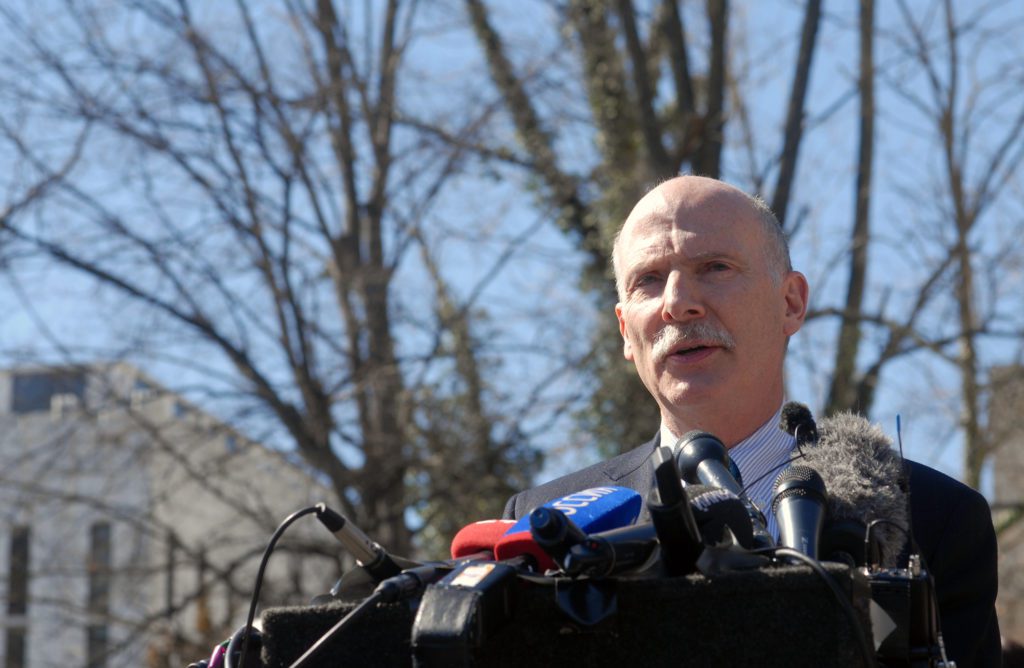
By Peggy Sands and Robert Devaney
As Council Chair, Mendelson Looks for Compromise
During his years as an at-large member of the District Council, from 1999 to 2012, Phil Mendelson was known as “12-to-1 Phil.” That’s because he was often the sole opposing vote on legislation that passed the Council.
But since he became Council chairman on June 13, 2012, following the resignation of Kwame R. Brown, Mendelson has negotiated veto-proof majorities for legislation on a surprisingly wide range of issues, including affordable housing, homelessness, gun control and food-vendor permits.
“The role of the chairman is about more than where you stand on an issue,” Mendelson told The Georgetowner in an hour-long interview in his large corner office in the John A. Wilson District Building. Almost every horizontal surface was covered by neat stacks of paper, legislative proposals and books. “My role now is to look for compromise and lead the deliberations to get something done,” he said.
Since Mendelson became chairman, there have been a lot more compromises and a lot more unanimous votes than in the past. And surprisingly, he noted, the meeting times have shortened to three to four hours.
One of Mendelson’s signature issues is affordable housing, an area of expertise he developed when first elected from McLean Gardens on Wisconsin Avenue. The American University graduate became a political activist while brokering a deal for residents either to purchase their homes at discounted prices or to take buyouts. He was then elected to the advisory neighborhood commission.
“Affordable housing is an issue that touches everyone across the city, from the homeless to working people, senior citizens to young, poor, single mothers, laborers and even the middle class earning $70,000 and more,” Mendelson said.
Thumbing through pages of D.C. regulations, he recounted a dozen ways to further address the housing affordability issue, such as tweaking taxable assessments, senior citizen credits and homestead deductions. Jason Shedlock, Mendelson’s former chief of staff, said his caring about the small stuff makes the Council chairman effective.
Before his chairmanship, Mendelson served eight years as chair of the Council’s Committee on the Judiciary, which is responsible for legislation affecting criminal laws in the District.
He is adamant that D.C.’s gun laws, which he largely helped to develop, remain the most restrictive in the country, with some adjustments. He sees a need for an increase in the minimum age to purchase (21, unless in the military or with parental permission), metal detectors, reduced magazine capacities and background checks that cover indicators such as domestic violence and arrests for driving under the influence.
A traditional, liberal Democrat, Mendelson also feels strongly that guns do not belong on school campuses. That puts him in contention with the president of the United States, who resides just two blocks away.
With the election of the unpredictable Donald Trump as president, a new factor of uncertainty was inflicted upon the District Council and its chairman. D.C.’s governance is still directly affected by who sits in the White House and which party controls Congress, which holds the power of review over D.C. legislation and executive action.
“There is general dislike of President Trump,” Mendelson said in his quiet, understated manner. “This is a very progressive city. Our diversity comes with our immigrant community. Trump’s going after them is counterproductive.”
Mendelson obviously believes in protecting all residents, including immigrants, regardless of status, from harsh police action. A supporter of the mayor’s $1-million fund for legal protection of illegal immigrants by nonprofits, he told The Georgetowner that he does not think D.C., as a “sanctuary city,” is vulnerable to punitive actions by the Trump administration (even though the Department of Justice and Immigration and Customs Enforcement are based here). “Of course, we do not offer sanctuary to protect convicted felons,” he noted.
Mendelson has his critics. Some say his style isn’t suited to confronting the aggressive interference from Republicans in Congress and the threat of billions in lost funding due to policies pushed by Trump. “We’re used to having Congress beat up on us,” Mendelson said with a sigh, “but now it’s not just them.”
In the June 19 Democratic primary election, Mendelson has an opponent for chairmanship of the Council. Ed Lazere is a longtime D.C. activist whose positions on homelessness, gentrification and racial equity are considered to be to the left of Mendelson. Coincidentally, both candidates come from Cleveland.
Nevertheless, the Capitol Hill resident has a good likelihood of being reelected chairman, according to Ward 2 Council member Jack Evans. “He has vast experience,” Evans said at a March 11 fundraiser for Mendelson at the home of Christine Warnke. “The focus on him should be on his leadership.”
D.C.’s Tuition Assistance Grants at Risk
District lawmakers are reacting strongly to the proposed elimination of federal funding for DCTAG, the tuition assistance program for which almost all D.C. public high school graduates are eligible, in President Donald Trump’s 2019 budget.
Congress created the District of Columbia Tuition Assistance Grant program in 1999. It provides up to $10,000 in grants (not loans) to help pay the difference between in-state and out-of-state tuition at public two- and four-year colleges and universities throughout the U.S., Guam and Puerto Rico. It also provides up to $2,500 per academic year toward tuition at private colleges in the Washington metropolitan area and at private historically black colleges and universities nationwide.
The program now receives $40 million in federal funds annually.
“More than 26,000 young people have been given the opportunity to pursue their dreams and attend college,” said Mayor Muriel Bowser. “It is unfathomable that any leader working to build a safer, stronger and more competitive country would choose to cut a program like this rather than expanding it. We are calling on Congress to fully fund this program,” she concluded at her State of the District talk March 15.
D.C. Del. Eleanor Holmes Norton (D) said she is confident she can maintain full funding for the program. Congress is considering an omnibus budget bill before government funding is set to expire March 23 and Norton does not expect DCTAG students to lose their grants.
The cap on annual family income for grant recipients has been reduced from $1 million to between $750,000 and $777,000.
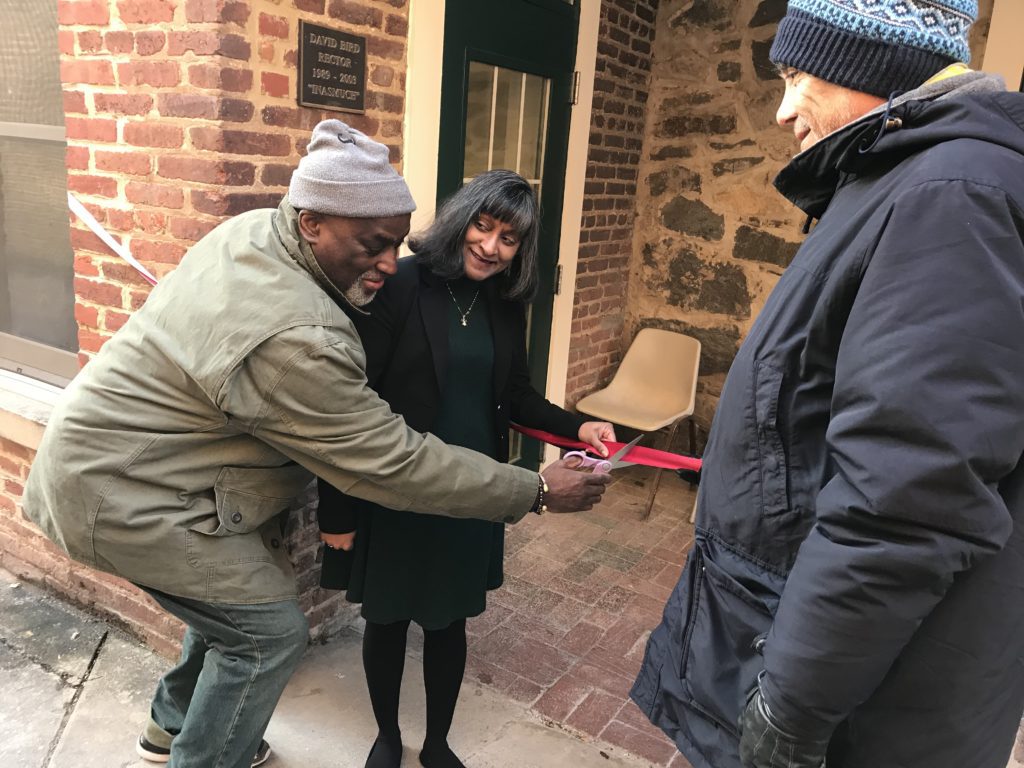
Georgetown Ministry Center guest Michael cuts the ribbon, held by Executive Director Lissa Ramsepaul, at the center’s new space as another guest, Ricardo, looks on. Photo by Carolyn Landes. Courtesy GMC.
Ministry Center Reopens in New Space With New Director
After undergoing major renovations, the Georgetown Ministry Center, which offers services to homeless individuals, reopened March 19 at 1041 Wisconsin Ave. NW. The launch of the new space comes just six weeks after Lissa Ramsepaul was welcomed as the center’s new executive director.
Ramsepaul succeeded Gunther Stern, who headed the Ministry Center for 27 years. As executive director, she oversees all aspects of the center’s operations, finances and personnel. A crisis counselor and nonprofit agency manager in the District for more than 20 years, she received her master’s degree in social work from Catholic University, where she is currently a Ph.D. candidate.
“Her passion is to provide ongoing care and support to those presently in need while simultaneously working to create longer term solutions to reduce homelessness and its underlying causes in our community and throughout society,” according to the Ministry Center, which prides itself for its work with service-resistant, chronically homeless individuals.
The center’s renovation was funded by the Share Fund, Arcana Foundation, Georgetown University’s Office of Campus Ministry and individual donors.
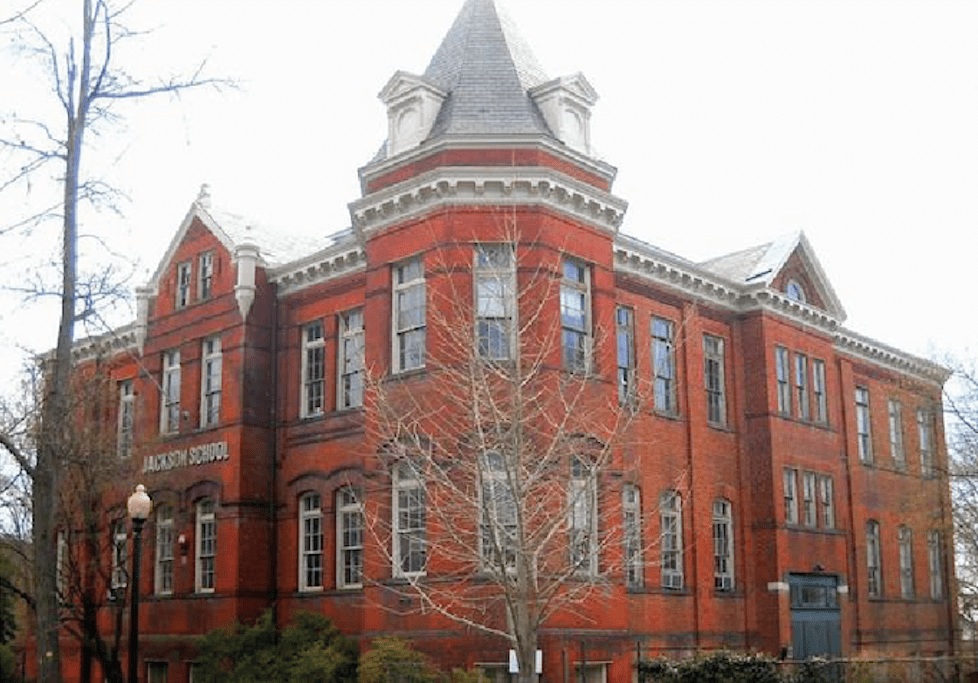 Jackson Close to Deal With DGS
Jackson Close to Deal With DGS
Artist-tenants and supporters of the Jackson Art Center at 3050 R St. NW are in final discussions with the D.C. government to renew the center’s lease, which expires June 30.
The property — a former D.C. public school, named for President Andrew Jackson, that operated from 1890 to 1970 — has been home since 1980 to a nonprofit that provides work studios for artists in what were originally classrooms. The Jackson Art Center organization rents the building from the Department of General Services, which oversees District-owned properties. As of last year, the annual rent was $145,000.
Gary Thompson, a partner at Weisbrod Matteis & Copley, is pro bono counsel to the Jackson Art Center and has been working with DGS on a lease contract.
“There is full agreement on Jackson remaining in the space,” Thompson told The Georgetowner. “The only remaining issue is the rental amount. Jackson has long paid an annual rent escalation. Going forward, Jackson has offered to pay an even larger rent increase of 10 percent.”
The Jackson group now has the attention of DGS and is in the process of wrapping up matters for the artists, according to Thompson.
“Jackson has the unanimous support of its friendly neighbors, hundreds of Ward 2 constituents on petitions, the Georgetown Advisory Neighborhood Commission, Citizens Association and other groups — as well as that of Council member Jack Evans,” Thompson added. “It is safe but needs major improvements for any other renter. Jackson is a perfect match for D.C.”
At press time, DGS Portfolio Director Yohance Fuller referred The Georgetowner’s inquiries to the DGS public information office. An agreement is expected soon.
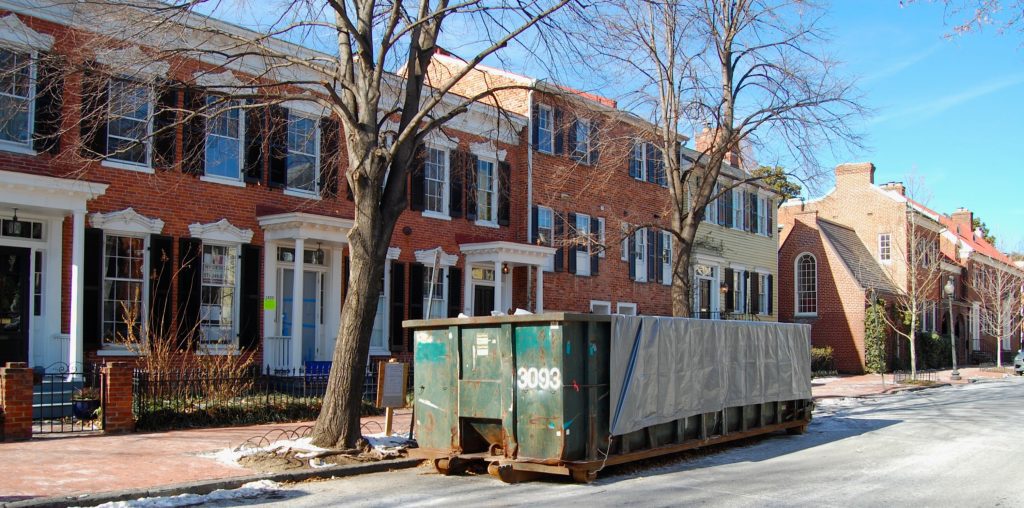 Tighter Dumpster Regulations Sought
Tighter Dumpster Regulations Sought
The problem of construction dumpsters occupying precious residential parking spaces — sometimes for months, even years (in the case of the 2900 block of Dumbarton Street) — was a focus of a walk around the east side of Georgetown with city officials last December. Now, Joe Gibbons, who chairs Advisory Neighborhood Commission 2E, and Commissioner Jim Wilcox have taken the issue to the District Council.
Last week, the ANC met with the Council’s Committee of the Whole, which has jurisdiction over the Department of Consumer and Regulatory Affairs, the agency that issues construction permits. DCRA Director Melinda Bolling was present. Commissioners noted that the number of long-term dumpsters seems to be increasing. Their placement can obstruct as many as four parking spots on the street.
“We advocated for better enforcement of the neighbor notification requirements by DCRA,” Wilcox reported. Joe Gibbons told The Georgetowner: “We want clarification about requirements for notices, the length of time a dumpster can be left in the neighborhood and the fees. We want to see enforcement with fines and the like.”
Council Chair Phil Mendelson has displayed some dissatisfaction with DCRA, even introducing legislation to break up the department, with substantial support from the rest of the Council, according to Wilcox. “Now we’ll have to wait and see what the outcome is.”
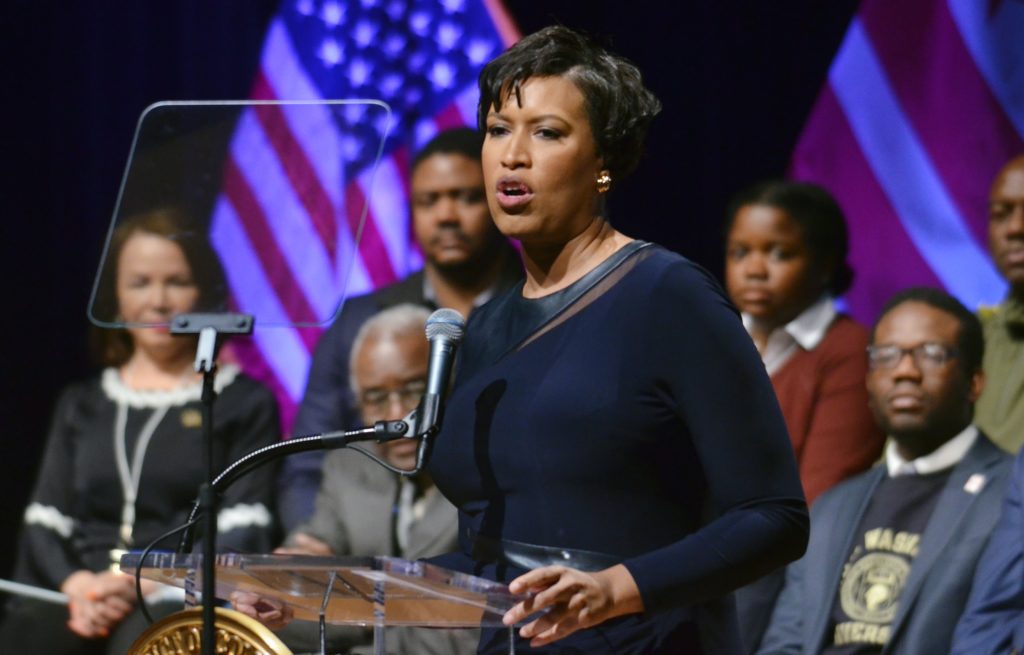 Mayor: Metro Will Be Fully Funded
Mayor: Metro Will Be Fully Funded
“We’re going all in and fully funding Metro for our future,” declared Mayor Muriel Bowser enthusiastically on Thursday evening, March 15, in the first moments of her State of the District address at the University of the District of Columbia. In a don’t-mess-with-me tone of voice, she added: “I’m proud that I’m the mayor and this is the government that will get it done.”
The mayor can be forgiven for her assertiveness. What looked like a done deal, a historic commitment between two states — Maryland and Virginia — and the District to permanently fund the transit system’s operations, maintenance and safety procedures, suddenly looked wobbly at the start of the week.
District Council Chairman Phil Mendelson and five Council members had reversed their backing of the proportional funding plan worked out by the mayor and Ward 2 Council member Jack Evans, who chairs the Washington Metropolitan Area Transit Authority board. That formula committed D.C. to contributing $178.5 million a year; Maryland and Virginia — with larger ridership and a much bigger tax base — were each to put in $167 million a year.
“It should be equal,” the Mendelson faction demanded.
But Bowser pointed out that D.C. had far more Metro stations than did the two states. And if the Council did not allocate its share in accordance with the plan, then Virginia could, by law, negate its commitment.
Evans said he agreed that, ideally, funding should be equal. But it was too late. “We have passed that point,” he said.
Hence, the mayor’s declaration at what D.C. calls the SOD: “We’re going all in!”

